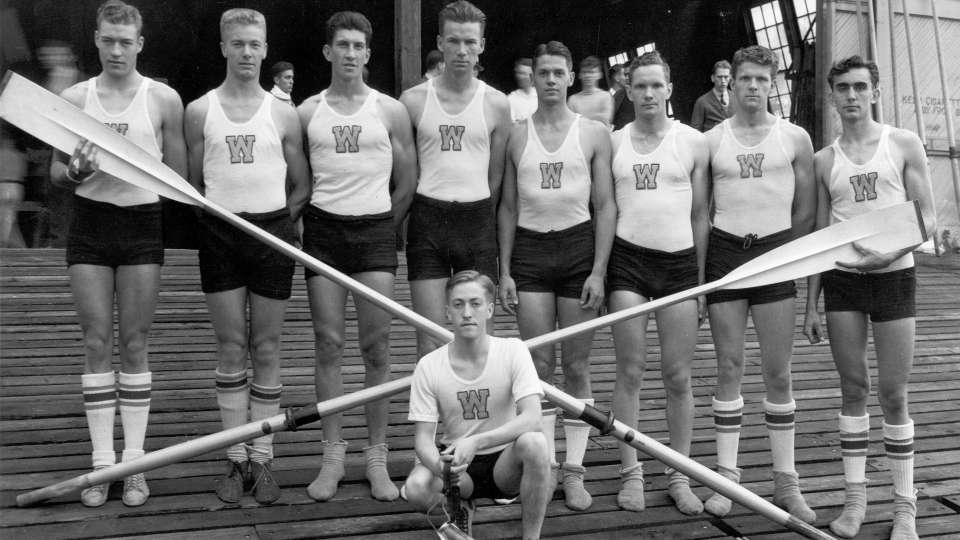
For more than 200 years, people have tested their physical and mental limits by competing in the sport of rowing. But few have captured the world’s imagination like the University of Washington rowing team did in 1936 when they went up against Nazi Germany in the Berlin Olympics. And their story has not been forgotten: it was turned into a bestselling book, by Daniel James Brown, and now a movie, both called “The Boys in the Boat.”
What explains the enduring interest in the Boys of ‘36 and the sport they mastered? Whether you’re competing for Olympic gold or just inspired by those who have, their effort showed the power of human endurance and resilience.
“You are, in fact, trying to inflict as much pain on yourself as possible and finding out what is the edge you can push yourself to physically before tipping over,” says Anne Browning, associate dean for well-being at the University of Washington School of Medicine.
She would know: she rowed at Harvard University, where she won a national crew championship, and then tried out for the U.S. national team. She also founded the UW Resilience Lab.
What is resilience?
Resilience, Browning emphasizes, isn’t an innate trait. The ability to persevere through or bounce back from something hard or challenging is a process that you can get better at.
“Part of how you develop resilience is you do things that get you into an uncomfortable state and then you learn how to find a kind of rhythm and balance and comfort within something that is triggering a whole lot of discomfort for you,” she says.
Sixty years before Browning took to the water, the University of Washington rowing team showed an unparalleled ability to do just that during their historic journey to the 1936 Olympics in Nazi Germany. The team of eight rowers and a coxswain survived difficult upbringings in rural Washington state, and many of them didn’t even know how to row when they joined the team. But they overcame obstacle after obstacle on and off the water to become one of the best crews in the world, facing the elite of the East Coast and Europe on their way to Berlin.
Browning shares some lessons from rowing — and the historic effort of the 1936 UW crew — for how to cultivate resilience in your own life, whether you’re interested in stepping into a rowing shell or not.
Practice radical acceptance
One of the most important pieces of building resilience, says Browning, is being able to accept and even lean into hard things.
“When we're experiencing something that is painful, when we push back against it, that is suffering,” she says. “But when we actually just accept it for what it is and embrace it, it's still painful, but that notion of suffering leaves us.” This practice is called radical acceptance.
Many of the rowers on the UW team experienced incredible hardship during the Great Depression while working grueling jobs farming, logging trees, even helping to build the Grand Coulee Dam on the Columbia River. In the boat, their physical and mental toughness helped them through the hardest races, powering through to the end when other boats succumbed to physical and psychological exhaustion. They were in pain too but found a way to accept the reality of it and keep moving.
Find connection and relationships
Another key to building resilience is having strong connections and attachments. It doesn’t have to be with a parent or guardian or family member; it can be with friends, teammates or a coach. “But having folks who see you and believe in you and are there for you is incredibly important,” says Browning.
The team that ended up being chosen for the varsity boat in 1936 found so much success in large part because they were able to let go of their egos and work as team that supported one another on and off the water. Their ability to trust each other became as important as their physical strength.
Whether you’re on a rowing team or part of a club or community group, whether it’s a coach or a manager or mentor, having people in your corner is essential for being able to face challenges and move through them.
Foster positive emotions
In order to get through something hard, it matters what the voice in your head is saying. If your thoughts are full of self-doubt and self-criticism, it’s going make it even more difficult. Instead, says Browning, it’s important to “cultivate an inner ally that shows up and supports you when things are the hardest.” That might mean coming up with a positive mantra to focus on and say to yourself or to your team.
The UW team’s coxswain, Bobby Moch, had many phrases and chants to keep his team motivated. One of them was M.I.B. or “Mind in the Boat.” In other words, don’t let your thoughts drift to negative places. These mantras pushed the UW rowing team through the hardest races. It can also be helpful to come up with a mantra in everyday life to get through stressful times, even something as simple as “I got this.”
Cultivate a sense of purpose
When the UW rowers first joined the team, they were just college kids learning the sport. They developed rivalries and grudges. But in 1936, with the chance of representing the United States in an Olympics on the precipice of WWII, they started rowing for something more than themselves and their egos.
Even if you’re not on the biggest global stage during a historic moment, the ability to cultivate a sense of purpose while going through something painful or hard, Browning says, is crucial to building resilience.
Focus on what you can control
A final piece of being resilient in the face of challenges is possessing the ability to focus on what you can control. And rowing provides a good metaphor for how to do that.
“You get really good at figuring out how can I move the boat faster. That becomes the metric: Did I move the boat as fast as I possibly could?” says Browning. “I can't actually control the speed of other folks. So, you try to understand what is in the sphere of your control and maximize performance in that space.”
During the 1936 season, all sorts of things went wrong for the UW rowing team. The weather affected many of their races, other teams tried to get in their heads, and they didn’t know how they’d pay for their trip to Europe. But even with everything that wasn’t going their way, when the UW rowing team focused on getting their strokes in sync, they were able to persevere.
It’s hard to resist being preoccupied with everything that’s going wrong in your life or in the world, but if you can focus on what you can control and put one foot in front of the other, you can get through more than you might imagine.

 Healthy ideas for your inbox
Healthy ideas for your inbox






